pari-, par-
(Greek: same, equal, equality, equal value)
comparable (adjective), more comparable, most comparable
Capable of having features in common with something else in order to permit or to suggest differences or similarities: Jack was offered two jobs with comparable wages, but after thinking about which one he should take, he chose the one closer to his home.
comparably (adverb), more comparably, most comparably
1. Pertaining to how something is contrasted or likened to something else: The incomes of the working people in the country did not increase comparably to the growth and development of the economy.
2. Concerning how something is contrasted or distinguished from another thing: During the Christmas shopping days, the crowds on Fridays were comparably smaller than those on Saturdays.
2. Concerning how something is contrasted or distinguished from another thing: During the Christmas shopping days, the crowds on Fridays were comparably smaller than those on Saturdays.
comparative (adjective), more comparative, most comparative
1. Considered relative to something known, mentioned, or expected: "I passed the test with comparative ease."
2. Based on using different things in the investigation of something to see if they are the same or different from each other: "Shirley was studying the various roles of women in several cultures."
3. In grammar a form of expressing an increase; for example, a description in the the form of an adjective or adverb that presents an increase in quality, quantity, or degree: "Examples of comparative grammatical words include, quicker, more importantly, better, sweeter, softly, and more favorable."
2. Based on using different things in the investigation of something to see if they are the same or different from each other: "Shirley was studying the various roles of women in several cultures."
3. In grammar a form of expressing an increase; for example, a description in the the form of an adjective or adverb that presents an increase in quality, quantity, or degree: "Examples of comparative grammatical words include, quicker, more importantly, better, sweeter, softly, and more favorable."
comparatively (adverb), more comparatively, most comparatively
Conveying something that is measured or judged against other things: "The students in Mr. Smith's biology classes were comparatively superior to those in other similar life-science studies."
The state or quality of relating one thing with something else or other issues: "The comparativeness of dictionaries with others often resulted in too many similarities; that is, the definitions were almost always the same or nearly repetitive of the others."
compare (verb), compares; compared; comparing
1. To examine two or more people or things in order to discover similarities and differences between them: "The police compared the forged signature with the one on the original license."
2. To consider or to represent someone or something as similar to another person or thing: "Some scientists compare the human brain to that of a computer."
3. To be equal or similar in quality or standing; especially, to be as good as another person or people.
4. To have a particular relationship with something or someone else: "If you compare this book with that document, you will find that the second presentation is almost a complete copy of the other one."
5. A suggestion that one thing is like another in some significant way; however, unlike in others: "The committee will have to compare the Senate's version of the health bill with the version that was passed by the House of Representatives."
2. To consider or to represent someone or something as similar to another person or thing: "Some scientists compare the human brain to that of a computer."
3. To be equal or similar in quality or standing; especially, to be as good as another person or people.
4. To have a particular relationship with something or someone else: "If you compare this book with that document, you will find that the second presentation is almost a complete copy of the other one."
5. A suggestion that one thing is like another in some significant way; however, unlike in others: "The committee will have to compare the Senate's version of the health bill with the version that was passed by the House of Representatives."
1. A statement or estimate of similarities and differences.
3. The quality of being similar or equivalent to something or a person.
3. The quality of being similar or equivalent to something or a person.
1. A person of equal status or rank; a peer.
2. A comrade, companion, or associate.
3. Someone who is a close companion or associate of somebody else.
2. A comrade, companion, or associate.
3. Someone who is a close companion or associate of somebody else.
disparage (verb), disparages; disparaged; disparaging
1. To speak disapprovingly or contemptuously to someone or something: When Sara was given less pay as a secretary, she disparaged her boss as an idiot who didn't deserve to be a supervisor.
2. To talk about anyone or anything in a disrespectful way; to belittle or "to put down": Sally's administrator was disparaging her as inefficient and unqualified and that she was lucky that he didn't fire her.
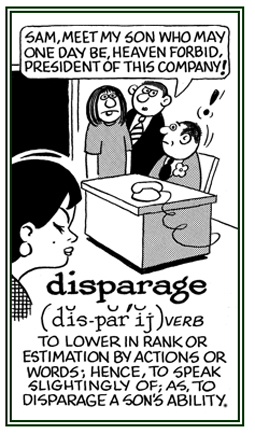
© ALL rights are reserved.
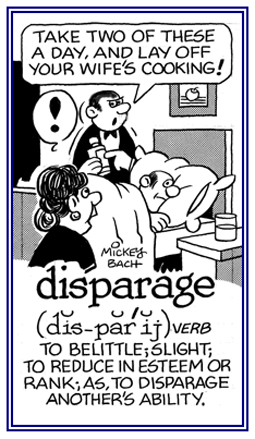
© ALL rights are reserved.
Go to this Word A Day Revisited Index
2. To talk about anyone or anything in a disrespectful way; to belittle or "to put down": Sally's administrator was disparaging her as inefficient and unqualified and that she was lucky that he didn't fire her.


Go to this Word A Day Revisited Index
so you can see more of Mickey Bach's cartoons.
1. Spoken of or treated in a belittling way.
2. Reproached, discredited and undervalued.
2. Reproached, discredited and undervalued.
disparaging (adjective), more disparaging, most disparaging
A description of something or someone as being undervalued, defamed, deprecated, or discredited: Larry was heard making disparaging remarks about his fellow workers, saying that they took too many coffee breaks or were often supposedly "sick" on Fridays!
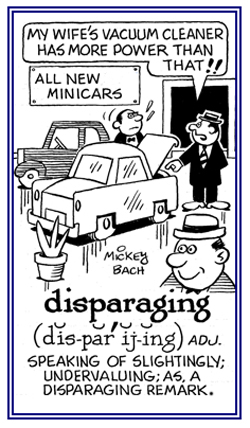
© ALL rights are reserved.
Go to this Word A Day Revisited Index

Go to this Word A Day Revisited Index
so you can see more of Mickey Bach's cartoons.
disparagingly (adverb), more disparagingly, most disparagingly
1. A reference to criticizing people in a way that shows that there is no respect or value for them.
2. Speaking of in a slighting or disrespectful way; belittling: Hank referred disparagingly to his car as an "old clunker".
2. Speaking of in a slighting or disrespectful way; belittling: Hank referred disparagingly to his car as an "old clunker".
disparate (adjective), more disparate, most disparate
Describing people or things that are fundamentally different in quality or kind; entirely dissimilar: The conversation was about disparate cultures that are building up in some countries as a result of so many foreign immigrants.
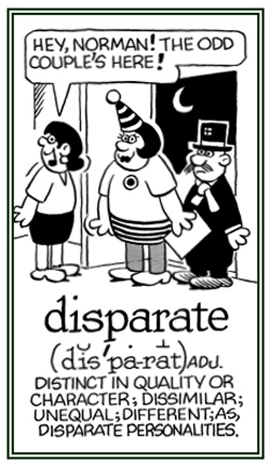
© ALL rights are reserved.
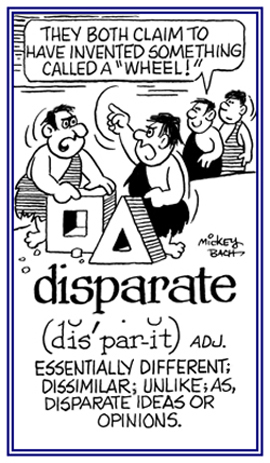
© ALL rights are reserved.
Go to this Word A Day Revisited Index


Go to this Word A Day Revisited Index
so you can see more of Mickey Bach's cartoons.
disparately (adverb), more disparately, most disparately
A reference to something containing or made up of fundamentally different and often incongruous elements which are utterly distinct in kind: "There was a disparately milder winter where Earl lived compared to where his brother had his home."
The condition or fact of being unequal, as in age, rank, or degree; inequality or different in some respect: There is a great disparity between the rich and the poor in every country.
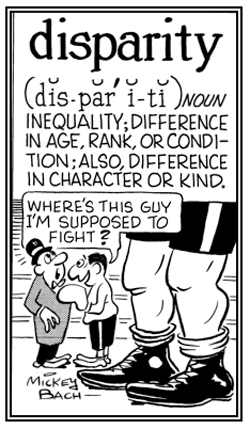
© ALL rights are reserved.
Go to this Word A Day Revisited Index


